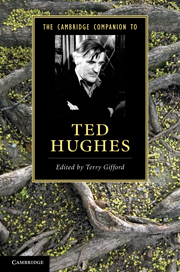Book contents
- Frontmatter
- Contents
- Acknowledgements
- Contributors
- Note on Referencing and Abbreviations
- Chronology
- Introduction
- 1 The problem of biography
- 2 The debates about Hughes
- 3 Hughes and animals
- 4 Ted Hughes and Sylvia Plath
- 5 The anthropologist’s uses of myth
- 6 Hughes’s social ecology
- 7 Hughes and feminism
- 8 Hughes and the classics
- 9 Hughes as prose writer
- 10 Hughes on Shakespeare
- 11 Class, war and the Laureateship
- 12 Hughes and his critics
- Guide to further reading
- Index
Introduction
Published online by Cambridge University Press: 28 July 2011
- Frontmatter
- Contents
- Acknowledgements
- Contributors
- Note on Referencing and Abbreviations
- Chronology
- Introduction
- 1 The problem of biography
- 2 The debates about Hughes
- 3 Hughes and animals
- 4 Ted Hughes and Sylvia Plath
- 5 The anthropologist’s uses of myth
- 6 Hughes’s social ecology
- 7 Hughes and feminism
- 8 Hughes and the classics
- 9 Hughes as prose writer
- 10 Hughes on Shakespeare
- 11 Class, war and the Laureateship
- 12 Hughes and his critics
- Guide to further reading
- Index
Summary
When some of us who have contributed to this book were asked in 2009 to support the campaign to have a memorial to Ted Hughes (1930–1998) installed in Westminster Abbey, the question we were asked to answer by the Dean was whether Hughes would be a poet whose work would still be read by generations to come. In one sense, this is impossible to guess. In another sense we were being asked whether the work of Hughes was of the stature of the towering figures of twentieth-century poetry who were themselves the major influences upon his own work as a young poet – figures such as W. B. Yeats, D. H. Lawrence, Dylan Thomas and T. S. Eliot. At the end of the first decade of the twenty-first century it is probably true to say that Hughes’s reputation as a poet has never been higher, both in the school and university curriculum and in British culture at large. There are also signs that, after largely ignoring his work during Hughes’s lifetime, American critics and teachers are starting to catch up. Hughes is often the only post-war English poet considered in books like Harvard professor Lawrence Buell’s Writing for an Endangered World (2001) and Stanford professor John Felstiner’s Can Poetry Save the Earth? (2009). Any course in British Modern Poetry would be incomplete without the inclusion of work by Ted Hughes. In the four years prior to May 2010 six books on the work of Hughes were published – five monographs and a collection of essays – plus two memoirs. In the last months of his life the publication of Birthday Letters (1998), following a lifetime of apparent silence about the tragic death of his first wife Sylvia Plath, brought a new audience to his work. At the same time, his translation of Tales from Ovid (1998) won literary awards and was turned into a highly successful play by Tim Supple and Simon Reade (1999). Hughes’s late flowering as a playwright translating classics of European theatre also added to the swell of praise that brought him a higher profile in his final years than individual volumes of poetry had done earlier in his life.
- Type
- Chapter
- Information
- The Cambridge Companion to Ted Hughes , pp. 1 - 13Publisher: Cambridge University PressPrint publication year: 2011
- 1
- Cited by



